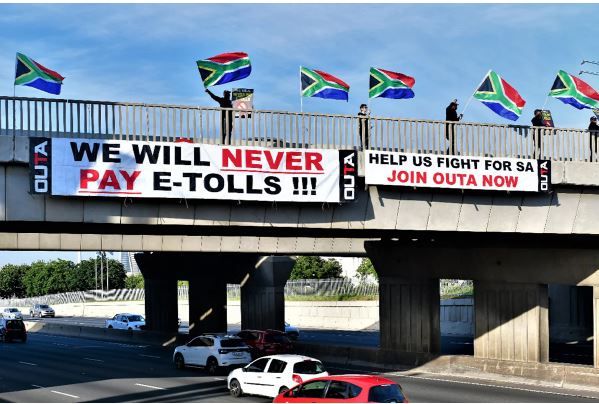
Goodbye E-tolls
After years of heavy resistance from motorists, Gauteng premier Panyaza Lesufi has announced that the province will scrap its much-hated e-toll system.
Lesufi’s announcement comes after finance minister Enoch Godongwana’s 2022 Medium Term Budget Policy Statement.
Godongwana revealed that the national and provincial governments would pay off Sanral’s debt on the Gauteng Freeway Improvement Project (GFIP).
The e-tolls were the mechanism meant to fund the GFIP, but fierce civil disobedience from motorists pushed Sanral’s debt from the scheme into tens of billions of rand.
While more recent statistics have been hard to come by, the e-toll compliance rate reportedly stood at less than 25% by November 2018.
“To resolve the funding impasse, the Gauteng provincial government has agreed to contribute 30% to settling Sanral’s debt and interest obligations, while national government covers 70%,” Godongwana said in his speech on Wednesday.
“Gauteng will also cover the costs of maintaining the 201 kilometres and associated interchanges of the roads and any additional investment in road will be funded through either the existing electronic toll infrastructure or new toll plazas, or any other revenue source within their area of responsibility.”
According to the Gauteng government, the total debt absorbed will be R47 billion. Gauteng will therefore bear the responsibility to pay off R14 billion.
Lesufi said Gauteng had agreed to the formulation of a new revenue enhancement model which excludes tolling, in alignment with an announcement from the minister.
“We are now ready to start a new life without e-tolls in Gauteng,” Lesufi said on Twitter. “This was not an easy decision, but necessary.”
Lesufi said there would be further engagements with Sanral on repurposing e-toll infrastructure, which his government believes could be used to fight crime.
The premier added that the way forward concerning people who had already paid for e-tolls would be up to Sanral.
Gauteng’s e-toll scheme has faced heavy resistance since its introduction in December 2013.
Much of this was driven by the civil action group Outa, initially called the Opposition Against Urban Tolling Alliance.
The organisation was formed in 2012 in anticipation of e-tolls coming into effect and immediately started lobbying against the scheme.
It was renamed the Organisation Undoing Tax Abuse to signal its move towards resisting other apparent abuses of tax.
Outa praised the decision in a statement shortly after Godongwana’s speech.
The organisation proposed that the funding of the GFIP be shifted to National Treasury and provincial government budgets years ago.
“After a decade of defiance, seven transport ministers and billions in uncollectable debt, government has finally acknowledged the end of e-tolls,” the organisation said.
Outa CEO Wayne Duvenage called the development a “massive victory for civil society” and thanked every person who stood up against the “irrational” scheme.
“Today, we thank thousands of motorists for standing their ground alongside Outa’s collateral challenge in the courts against e-toll defaulters, and remained steadfast on this matter,” Duvenage said.
“This battle was not an easy one, with the onslaught of government propaganda, expensive court challenges, excessive bullying and coercive campaigns.”
Duvenage said the scheme had all the signs of failure long before it was launched, but government proceeded without listening to its citizens or the many organisations that opposed e-tolls.
“Despite evidence-based research from Outa pointing to the scheme’s obvious failures, government persisted for years, resulting in the waste of billions of rand in taxpayers’ money on this expensive, irrational and overpriced collection scheme,” Duvenage said.
News Category
- International retailers
- On the move
- Awards and achievements
- Legislation
- Wine and liquor
- Africa
- Going green
- Supplier news
- Research tools
- Retailer trading results
- Supply chain
- Innovation and technology
- Economic factors
- Crime and security
- Store Openings
- Marketing and Promotions
- Social Responsibility
- Brand Press Office
Related Articles

Empowering South African households through gro...

SPAR shares practical tips to beat food inflation

South African motorists could be paying up to R...

Big VAT changes on the cards


